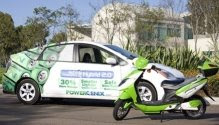 I was talking with a good friend the other day about the future of cars - in particular - electric cars. I really have a soft spot for the electric car future. The cars themselves wouldn't produce any pollution. They would be much easier and cheaper to maintain. The electric motors would make the cars more efficient in that they could easily convert to generators to recapture energy normally lost to heat while coasting or braking.
I was talking with a good friend the other day about the future of cars - in particular - electric cars. I really have a soft spot for the electric car future. The cars themselves wouldn't produce any pollution. They would be much easier and cheaper to maintain. The electric motors would make the cars more efficient in that they could easily convert to generators to recapture energy normally lost to heat while coasting or braking.Of course, the biggest obstacles to an electric car future are the generation of all that extra electricity and the storage of energy in the car itself. We've been promised that the future is hydrogen fuel cells. The hydrogen would mix with oxygen from the air to produce electricity on demand with a by-product of water vapour. The problem is two-fold. Where do you get the energy to make all this hydrogen? Is it actually efficient to make hydrogen only to change it back to energy again? Some are suggesting it uses more energy this way. Plus there's the issue of the hydrogen infrastructure. How do we get all this hydrogen to fuelling stations?
Wouldn't it be way easier to use a form of battery to store the energy? Then just recharge the battery when the opportunity presents itself. Unfortunately, battery technology has not evolved to the degree we need to make this a viable option. Most electric cars need many hours to fully recharge and this pretty much limits us to only being able to travel the range of the battery's capacity in any one day. This will not meet the needs of any family that wants to drive any great distance. There is also the issue of battery disposal. Batteries typically only allow for so many charge / recharge cycles before they need to be replaced. This isn't very efficient, nor very environmentally friendly.
According to my friend, a solution is around the corner. MIT is working on a new type of lithium-ion battery that combines the best characteristics of batteries and capacitors, ending up with a (gadget-sized) battery that can recharge in 10 seconds. Translate this up to car capacity and you'd be able to fully charge a car's batteries in 5 minutes versus 8 hours. The new battery design also does not degrade with repeated charging. This changes the entire game. This makes it possible to use a car cross-country. That's exciting.
If this succeeds, powerful, affordable, quick-charging batteries could be used to store energy from intermittent, non-carbon energy sources like wind generators or solar cells, helping to usher out the age of fossil fuels.

5 comments:
take on this is always that you'd need to use electricity to charge the batteries and most of the world still burns coal to produce electricity, so you'd be increasing pollution THAT way with electric cars. I don't know what the difference is, more, less or the same....but something to think about. H.
We'll definitely need to find cleaner methods to produce electricity. I just glanced at an article that suggests that if the US built off-shore wind farms, they could satisfy the entire country's current appetite for electricity.
Most of the U.S. still burns coal to produce electricity. "King Coal" and its lobbyist have a stranglehold on their Congress and Senate. You want to talk about political corruption & lack of integrity, I don't think you have to look all the way over to Africa.
Not that Canada's any better. Democracy being the worst form of government except for all others and all that.
Well, at least we're not turning this into a political discussion.
; )
This is one pretty interesting development re: batteries.
Down another rabbit-hole: Bernie has a point based on the current situation, but overall there is huge environmental promise in electric cars, at least for city transportation. Given that the US is actively pursuing legislation requiring that 25 percent of electricity come from renewable resources, there are some lights at the end of this tunnel. Yes, there will be opposition but lobby interests in the US aren't as strong as they were pre-Obama.
WorldChanging has several great articles on this topic. Do a site search on "electric car".
Post a Comment